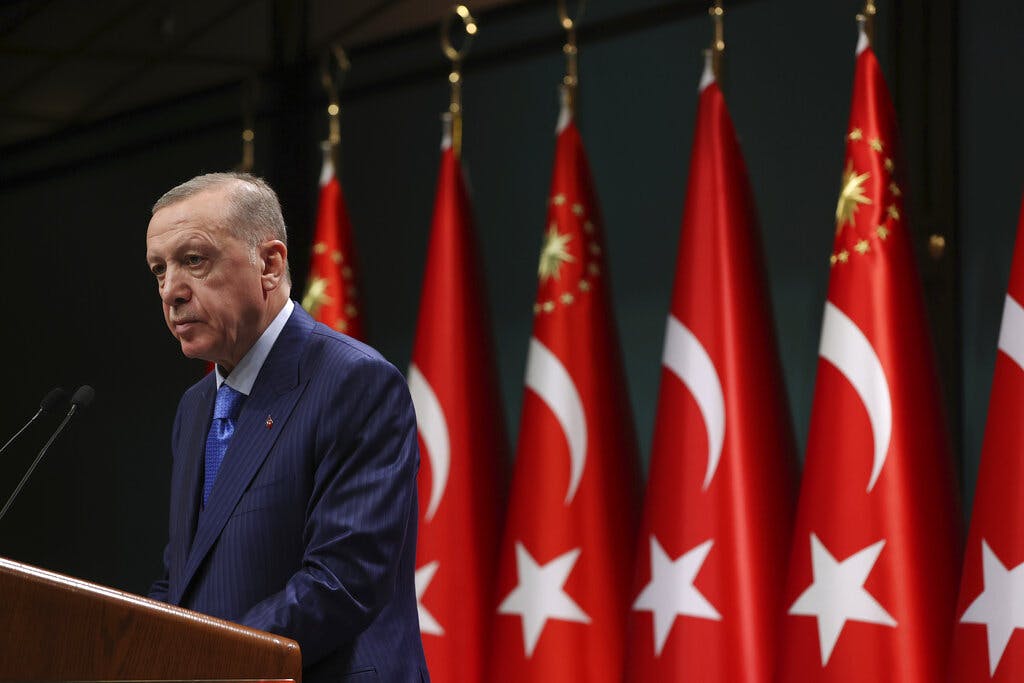Koran Burning at Stockholm Fuels Erdogan Campaign of Outrage
The Turkish president blocks any talk of NATO expansion until after his election, much to the Kremlin’s delight.

President Erdogan, exploiting a crisis that works to his political advantage, is forcing NATO to delay its possible expansion until after the Turkish election — much to the Kremlin’s delight.
After a Koran was burned during a Saturday protest in Sweden, Mr. Erdogan said Monday that the country shouldn’t expect Turkey to support its membership in the North Atlantic Treaty Organization. All members of the alliance, including Turkey, must approve the request before Sweden, as well as Finland, will be allowed to join.
Mr. Erdogan has opposed the widening of the alliance before, but his over-the-top anger at this affront to Islam has, at least temporarily, put the kibosh on hopes at Stockholm and Helsinki of joining the alliance. The two NATO aspirants now say negotiations with Ankara will be deferred until the spring.
The delay exposes fissures inside an organization that has emerged as the most powerful Ukraine supporter in the nearly year-long war at the heart of Europe. Russia’s president has portrayed the alliance as the bogeyman that has forced him to invade Ukraine; now he can use the crisis to his advantage.
The rousing of religious passions has long been a signature of Mr. Erdogan’s campaigning style. Yet, the Turkish economy is tanking, and Ankara is asking Moscow to delay until next year the payments it owes on gas purchased from Russia. The deferment could help Mr. Erdogan’s prospects in the May 14 national vote.
With inflation at more than 80 percent, high unemployment, and slow growth, Mr. Erdogan has pumped subsidies into the economy, printed lira out of thin air, and asked Russia and other creditors for deferments. It all adds up to a “sugar high,” and the economy is expected to crash as soon as the election is over, a Turkey watcher at the Foundation for Defense of Democracies, Sinan Ciddi, said.
Meanwhile, Turkish press outlets are covering the Saturday Koran-burning incident extensively, and the Kremlin is watching NATO’s bickering with glee. Mr. Erdogan’s political needs and Mr. Putin’s strategic interests seem to mesh perfectly.
“If they manufactured this crisis, they couldn’t have done a better job,” Mr. Ciddi told the Sun. At the same time, Sweden and Finland seem resigned to a delay in their negotiation with Turkey over their NATO membership aspirations.
“A time-out is needed before we return to the three-way talks and see where we are when the dust has settled after the current situation, so no conclusions should be drawn yet,” the Finnish foreign minister, Pekka Haavisto, said in an interview with Reuters on Tuesday.
While all other NATO members expressed support for Sweden and Finland immediately after they applied for membership last year, Mr. Erdogan put up roadblocks right from the start. One of his biggest complaints was the existence of a large Kurdish population in Sweden, which he said is akin to harboring terrorists.
Anti-Kurdish sentiments are part and parcel of Mr. Erdogan’s populist appeal. So are religious pieties, and the Saturday protest in front of the Turkish embassy at Stockholm was a perfect fit for his narrative. It was during this rally that a firebrand far-right Danish politician, Rasmus Paludan, burned a Koran, raising Muslim anger around the world.
“Those who allow such blasphemy in front of our embassy can no longer expect our support for their NATO membership,” Mr. Erdogan said of Sweden. “If you love members of terrorist organizations and enemies of Islam so much and protect them, then we advise you to seek their support for your countries’ security.”
Mr. Paludan, whose party, Hard Line, couldn’t muster the minimum votes needed to join the Danish parliament in 2019, has pulled the Koran-burning stunt before. A dual Danish-Swedish citizen, his political claim to fame is attacking migrants and provoking anti-Islam passions.
“Freedom of expression is a fundamental part of democracy,” the Swedish prime minister, Ulf Kristersson, tweeted Saturday, “but what is legal is not necessarily appropriate. Burning books that are holy to many is a deeply disrespectful act.”
The Biden administration expressed a similar sentiment, with the state department’s spokesman, Ned Price, adding, “We are cognizant of the fact that those who may be behind what has taken place in Sweden may be engaging in an intentional effort to try to weaken unity across the Atlantic.”
Finland and Sweden “are ready to be NATO allies,” Mr. Price said. “We have voiced that consistently, but ultimately, this is a decision and a consensus that Finland and Sweden are going to have to reach with Turkey.”
Washington has little leverage over Ankara these days, and like Finland and Sweden seems to be resigned to the idea that any changes in NATO’s membership now depend on Mr. Erdogan’s campaign calendar.
The strongmen at Ankara and Moscow couldn’t be happier.

